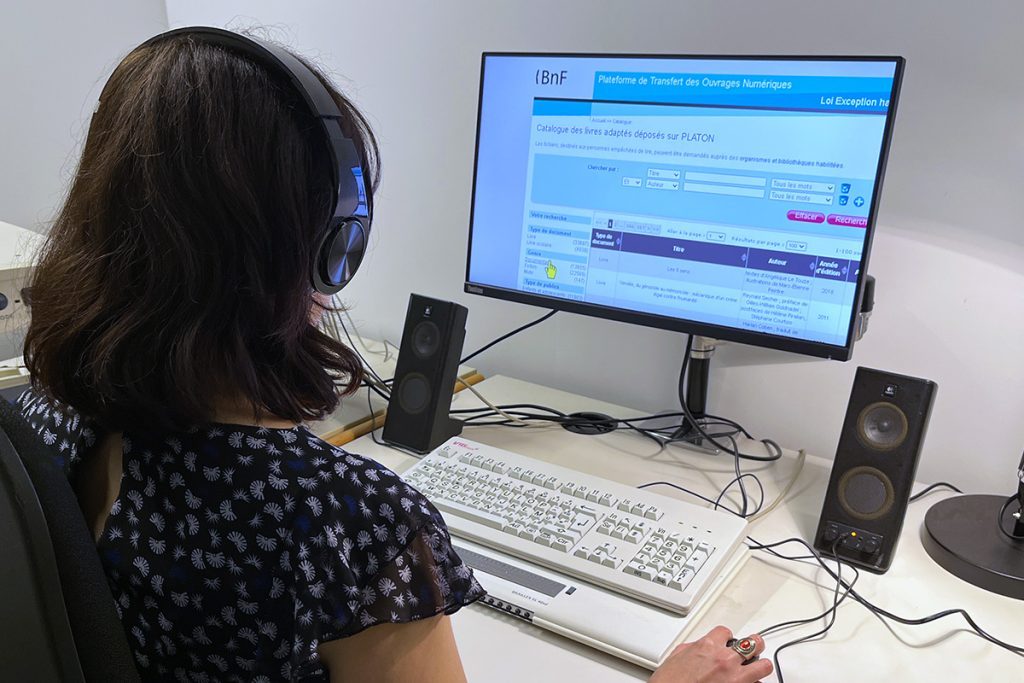How to obtain an adapted book with the disability exception to copyright?
Registration for the booths service includes the benefit of the disability exception to copyright, which allows the copying or transformation of a document without the consent of the author or publisher. Find out how to obtain a suitable work.

The law provides for an exception to copyright in order to promote access to works for people with disabilities. It allows authorized organizations to produce and communicate adapted versions of protected works (novels, textbooks, essays, etc.) without having to seek prior authorization from the copyright holders.
Any person with a motor, sensory, psychological, intellectual or cognitive disability can benefit from the exception to copyright as long as they are prevented from reading on the original support due to their disability. This definition takes into account the needs of people with cognitive or learning disorders such as dyslexia, dysphasia, dyspraxia and dyscalculia (“DYS” disorders).
Here are a few tips for finding suitable books:
Use the PLATON platform
You can first consult the Platon catalog (Digital Works Transfer Platform) managed by the National Library of France. This allows you to check whether the document you’re looking for is available in the adapted digital format that suits you (e.g. Braille, audio in Daisy format, adapted layout for DYS users, etc.).
The Bpi can provide adapted versions of works in digital format, stored on the Platon platform. Requests for adapted works can be made on site by registering with the Self-Training office. To register, all you need to do is present proof of your disability (e.g.: inclusion mobility card, document from the MDPH, university disability mission, RQTH, medical certificate, declaration of honor, etc.).
The beneficiary undertakes to respect the rules governing exceptions to copyright: the use of these documents is strictly personal, and the file may be kept for as long as the user needs it, and then destroyed. Any reproduction is forbidden.
Resources are sent by e-mail.
If you would like to take advantage of this service but are unable to come in person, please send your request to the Bpi’s Reading and Disability Department: lecture-handicap@bpi.fr.
Identify or seek accommodation elsewhere
A few ways to find an accessible document:
- Eole, offered by the media library of the Valentin Haüy association. It is a library of digital books adapted for people for whom reading is difficult due to their disability. It is possible to download books directly after creating an account for free.
- Les Bibliothèques sonores from the Association Donneurs de Voix : this digital library offers audio books and magazines recorded by volunteer voice-givers. Registration is free. You can download books or order them on CD, USB key or SD card.
- The BDEA, or Adapted Publishing Data Bank, managed by the National Institute for Blind Youth. This database makes it possible to consult the file of an adapted work. It allows you to locate the document but not to download it.
Don’t hesitate to ask our librarians, who can help you find a suitable book and, if necessary, create an account on one of these platforms!
Request an adaptation
Accredited organizations can ask publishers for digital files of printed works with a legal deposit date of less than ten years. An up-to-date list of these organizations is available on the Ministry of Culture website.
You can ask these organizations to make the adaptations you need, or ask the Bpi’s Service Lecture et handicap for advice: lecture-handicap@bpi.fr
Publié le 31/01/2025 - CC BY-SA 4.0
